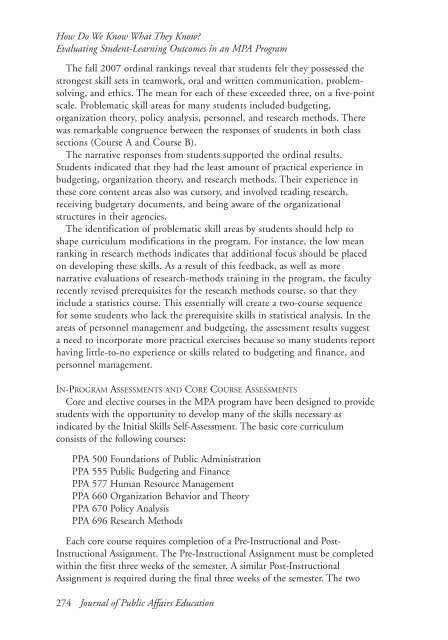JOURNAL OF PUBLIC AFFAIRS EDUCATION - naspaa
JOURNAL OF PUBLIC AFFAIRS EDUCATION - naspaa
JOURNAL OF PUBLIC AFFAIRS EDUCATION - naspaa
Create successful ePaper yourself
Turn your PDF publications into a flip-book with our unique Google optimized e-Paper software.
How Do We Know What They Know<br />
Evaluating Student-Learning Outcomes in an MPA Program<br />
The fall 2007 ordinal rankings reveal that students felt they possessed the<br />
strongest skill sets in teamwork, oral and written communication, problemsolving,<br />
and ethics. The mean for each of these exceeded three, on a five-point<br />
scale. Problematic skill areas for many students included budgeting,<br />
organization theory, policy analysis, personnel, and research methods. There<br />
was remarkable congruence between the responses of students in both class<br />
sections (Course A and Course B).<br />
The narrative responses from students supported the ordinal results.<br />
Students indicated that they had the least amount of practical experience in<br />
budgeting, organization theory, and research methods. Their experience in<br />
these core content areas also was cursory, and involved reading research,<br />
receiving budgetary documents, and being aware of the organizational<br />
structures in their agencies.<br />
The identification of problematic skill areas by students should help to<br />
shape curriculum modifications in the program. For instance, the low mean<br />
ranking in research methods indicates that additional focus should be placed<br />
on developing these skills. As a result of this feedback, as well as more<br />
narrative evaluations of research-methods training in the program, the faculty<br />
recently revised prerequisites for the research methods course, so that they<br />
include a statistics course. This essentially will create a two-course sequence<br />
for some students who lack the prerequisite skills in statistical analysis. In the<br />
areas of personnel management and budgeting, the assessment results suggest<br />
a need to incorporate more practical exercises because so many students report<br />
having little-to-no experience or skills related to budgeting and finance, and<br />
personnel management.<br />
IN-PROGRAM ASSESSMENTS AND CORE COURSE ASSESSMENTS<br />
Core and elective courses in the MPA program have been designed to provide<br />
students with the opportunity to develop many of the skills necessary as<br />
indicated by the Initial Skills Self-Assessment. The basic core curriculum<br />
consists of the following courses:<br />
PPA 500 Foundations of Public Administration<br />
PPA 555 Public Budgeting and Finance<br />
PPA 577 Human Resource Management<br />
PPA 660 Organization Behavior and Theory<br />
PPA 670 Policy Analysis<br />
PPA 696 Research Methods<br />
Each core course requires completion of a Pre-Instructional and Post-<br />
Instructional Assignment. The Pre-Instructional Assignment must be completed<br />
within the first three weeks of the semester. A similar Post-Instructional<br />
Assignment is required during the final three weeks of the semester. The two<br />
274 Journal of Public Affairs Education
















